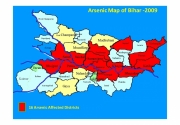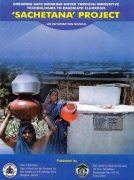/topics/contamination-pollution-and-quality
Contamination, Pollution and Quality
A simple and marvellous solution to clean ocean oil spills
Posted on 29 May, 2010 11:19 AMPlease have a look at the Demonstration video about clearing oil spills in oceans or any other water body.
http://video.godlikeproductions.com/video/CWRoberts_Presentation_2wmv
It is a simple and effective method.
Drinking water quality monitoring and management training, TARA Livelihood academy, Orchha, MP
Posted on 25 May, 2010 04:22 PM
Organizers:TARA Livelihood Academy
"Kochi: To Get Rs 100 Crore Modern Sewerage System" : Droplets (May '10)
Posted on 25 May, 2010 12:08 PM
Highlights
- Kochi: To Get Rs 100 Crore Modern Sewerage System
- Punjab: Rs 53.58 Crore New Water Supply & Sewerage Project
- Pune: To Construct 120 MLD Water Filtration Plant
- Water.Org: Launches India WaterCredit Forum
Arsenic contamination of groundwater in Bihar and mitigation strategies - A research study
Posted on 12 May, 2010 11:24 PM This presentation deals with the problem of arsenic contaminated aquifers in the Gangetic belt of Bihar and the failure of the state government in tackling the crisis and calls for the establishment of a centralized knowledge & research hub with an understanding of the regional peculiarities to mitigate the crisis.
This presentation deals with the problem of arsenic contaminated aquifers in the Gangetic belt of Bihar and the failure of the state government in tackling the crisis and calls for the establishment of a centralized knowledge & research hub with an understanding of the regional peculiarities to mitigate the crisis.
It traces the origin of arsenic crisis to the switch from use of surface water to groundwater. The health impacts of arsenic poisoning and the factors that aggravate arsenicosis are explained. A total of sixteen districts (fifty-seven blocks) in Bihar are affected by high levels of arsenic in groundwater, in trivalent form, which is a more toxic form of arsenic.
Formulating action plan for removal of arsenic contamination in West Bengal - Planning Commission Task Force report
Posted on 12 May, 2010 11:49 AMThe report of the Task Force appointed by the Planning Commission presents an action plan for removal of arsenic contamination in West Bengal. It looks at the extent of the problem, its intake sources, technologies available and the operation and maintenance (O&M) issues.
It outlines the diverse technologies based on various scientific principles, assesses them based on their scale of operation (domestic or community) on techno-economic considerations & infrastructure required and provides suggestions. Short, medium and long term measures are outlined for tackling the problem of arsenic contamination in drinking water supply in the state.
Ensuring safe drinking water through innovative technologies to eradicate fluorosis - Sachetana Project - Information manual by BIRDK and Govt of Karnataka
Posted on 05 May, 2010 05:31 PM This manual produced by BIRD-K and DRDPR (GoK) provides the details of the Sachetana project that aims to provide safe drinking water to fluorosis affected populations through the adoption of innovative technologies for rainwater harvesting and groundwater recharge.
This manual produced by BIRD-K and DRDPR (GoK) provides the details of the Sachetana project that aims to provide safe drinking water to fluorosis affected populations through the adoption of innovative technologies for rainwater harvesting and groundwater recharge.
The project is being implemented through the Gram Panchayats of 60 villages from 4 taluks among three districts of Karnataka state over a period of five years (2006-11).
The objectives of the project include:
- Provision of safe drinking water through innovative rain harvesting structures
- Recharge of groundwater through excavation of percolation ponds
- Recharge of existing bore wells and direct recharge of aquifers
- Awareness generation activities to promote sustainable management and management of water resources and water harvesting structures.
Rainwater filtration from large roofs in polluted environments to potable quality
Posted on 21 Apr, 2010 05:25 PMIs there anyone in India who is willing to develop a multi-stage Saferain unit with me?
Imagine a 5000 sq metre factory in New Delhi, (or Shanghai, or wherever).
The air is polluted, the roof is polluted, and, yet, I say that potable. or near so, can be delivered in a rain event. The following is a cut and paste. This is how it's
Press release : UL certifies Kimberlite Chemicals for health effects in drinking water
Posted on 20 Apr, 2010 11:25 AM
For Immediate Release
Underwriters Laboratories Certifies Kimberlite Chemicals for Health Effects in Drinking water
Kimberlite Chemicals Becomes First Indian Company to Earn UL
Certification for Antiscalant Water Treatment Chemicals
Bangalore, India, April 14 2010 – Underwriters Laboratories (UL), a global leader in drinking water quality and safety, today announced that Kimberlite Chemicals India Pvt. Ltd., received UL certification for its antiscalant water treatment chemicals. Kimberlite’s antiscalant water treatment chemicals will now bear the UL Classified Water Quality Mark, indicating certification to ANSI/NSF Standard 60 for health effects.
UL launched its drinking water product certification program in India in 2009 and has been working with a number of Indian companies on a broad range of products including disinfection and oxidation chemicals, coagulants, drinking water treatment units, gaskets, butterfly valves, sediment filter cartridges and activated carbon. Kimberlite, a renowned company known for its world-class technology product and service in the field of specialty chemicals and coatings, is the first Indian manufacturer to be certified through UL’s water program for antiscalant water treatment chemicals.
UL’s certification of Kimberlite’s antiscalant chemicals provides verification that these chemicals have been independently tested and validated to meet both industry standards for health effects in drinking water as well as UL’s rigorous certification requirements. Antiscalant chemicals are used to protect reverse osmosis (RO) membrane life and are used in industrial RO purifiers.
A plan to clean and stop pollution in Yamuna within 7 months
Posted on 01 Apr, 2010 11:29 AMDelhi, India
I, Gopi Dutt, want to draw your attention to problem that Delhi has been facing since as long as 10 yrs now. I am talking about the pollution in Yamuna caused by devotional material, Polybags, Flowers etc. Our govt., different NGOs and now Maharaja Sri Sri Ravi Shankar have put their best efforts to clean up the river. We all have been trying to clean it up for the past 10 yrs but it hasn’t stopped yet. Does anyone have a plan to stop this that here is no further need to clean n re-clean the river? The problem is that we only create awareness that people should not pollute the river but there are no measures taken to stop this pollution.
Bioremediation of turbid surface water using seed extract from Moringa Oleifera Lam (Drumstick Tree)
Posted on 26 Mar, 2010 06:38 PMThis research paper describes an indigenous water treatment method, that uses Moringa oleifera (Drumstick) seeds in the form of a water-soluble extract in suspension, resulting in an effective natural clarification agent for highly turbid and untreated pathogenic surface water.





